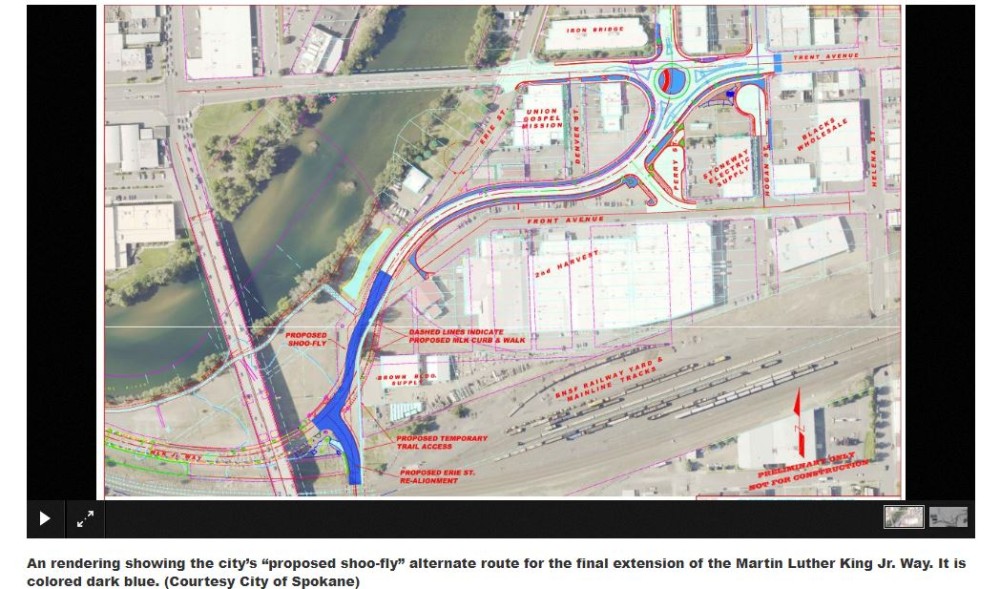Getting There: Snags emerge in downtown’s east end development
Monday, May 21, 2018

(as reported in The Spokesman Review by Nicholas Deshais)
The rising pedestrian bridge in Spokane’s University District, the gliding path of Martin Luther King Jr. Way, a new roundabout on Trent and the expansion of the Ben Burr Trail for cyclists and other non-motorized commuters: Going into this construction season, the east end of downtown had a lot going for it.
But now, with yet another delay in the trial between the city and the owner of Brown Building Materials over the city’s push to condemn a piece of Brown’s land and take it through eminent domain, the city will most likely build a temporary bypass around Brown’s building and parking lot.
The trial, which was first set for last fall before a health issue delayed the testimony of an appraisal officer, was due to begin in weeks. Now, as the sides scramble to finish the discovery process after failed mediation, the trial’s scheduled for October. Right near the end of construction season.
Everything’s rosy, except the gliding MLK Way will have a bit of a wiggle.
That and Brown’s attorney, Bob Dunn, wants the judge to force the city to pay for condemnation of Brown’s entire 2.9-acre property, not just part of his parking lot and what Dunn described as a “total take” of access to Brown’s property. If Judge Maryann Moreno agrees with Dunn’s motion in the next week weeks, the decimal point would move some, from $35,000 to about $2 million.
The temporary bypass, Dunn said, may not be so temporary in that case.
“If they lose this motion and somebody tells them they have to pay $2 million and relocate my client” the alternate route may become permanent, Dunn suggested. “Which is what they should’ve done in the first place.”
Dunn pointed to a case he helped argue and won in 1997 that he said was something of a precedent –the State of Washington v. The Wandermere Company and Acme Concrete Company.
In that case, which revolved around building the first section of the North Spokane Corridor, the state argued that it could take a 24-acre piece of land, which was being used to mine sand and gravel, to build the north-south freeway, and compensate the company $38,900. Wandermere, which was leasing the land to Acme, argued that the state couldn’t just take part of the property, but had to pay for the entire 62 acres.
The jury agreed with Wandermere, and ordered the state to pay $3.5 million.
Of course, the city probably doesn’t agree with Dunn’s assessment, but Marlene Feist, director of strategic development for the city public works and utilities department, said she couldn’t discuss ongoing litigation.
She didn’t, however, seem too concerned about the bypass, which the city refers to as the “proposed shoo-fly.” She expressed hope that the city and Brown may come to an agreement through mediation and allow the full project, as designed, to be built.
A shoo-fly is a railroad term referring to a “temporary track used to avoid an obstacle that blocks movement on the normal track section,” according to a glossary of terms on the Union Pacific website.
Regardless, if the bypass is built, Feist said it would be harder to maneuver for vehicles and wouldn’t include the full slate of facilities the rest of the road would have, like bike lanes and landscaping.
“It just skirts the road a little bit. We would do it without all the full meal deal,” she said. “We can proceed, which is why we designed it and had that option in the first place. We’d prefer not to build it, but we can be practical.”
Building the bypass will add $70,000 to the $4.3 million project, which is the third phase of MLK Way construction. The first phase of the project, which went from Division Street to Sherman Street, cost $3.8 million. The second phase, which extended the road to Erie Street but is not yet open to motorists, cost $3.9 million.